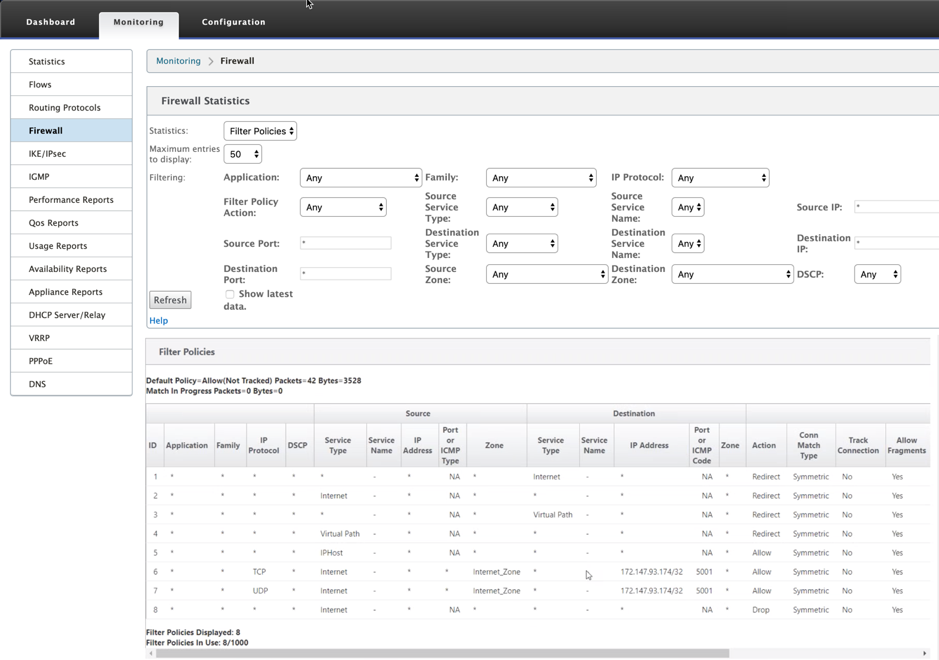Hosted firewalls
Citrix SD-WAN Orchestrator™ service supports the following hosted firewalls:
Palo Alto Networks firewall integration on SD-WAN 1100 platform
Citrix SD-WAN™ supports hosting Palo Alto Networks Next-Generation Virtual Machine (VM)-Series Firewall on the SD-WAN 1100 platform. The following are the supported virtual machine models:
- VM 50
- VM 100
The Palo Alto Network virtual machine series firewall runs as a virtual machine on SD-WAN 1100 platform. The firewall virtual machine is integrated in Virtual Wire mode with two data virtual interfaces connected to it. Required traffic can be redirected to the firewall virtual machine by configuring policies on SD-WAN.
For information on how to provision the firewall virtual machine through SD-WAN Orchestrator service, see Hosted firewalls.
Benefits
The following are the primary goals or benefits of Palo Alto Networks integration on the SD-WAN 1100 platform:
-
Branch device consolidation: A single appliance that does both SD-WAN and advanced security.
-
Branch office security with on-prem NGFW (Next Generation Firewall) to protect LAN-to-LAN, LAN-to-Internet, and Internet-to-LAN traffic.
Firewall virtual machine provisioning through SD-WAN appliance GUI
On SD-WAN platform, provision and boot up the hosted virtual machine. Perform the following steps for provisioning:
-
From Citrix SD-WAN GUI, navigate to Configuration > expand Appliance Settings > select Hosted Firewall.
- Upload the software image:
- Select the Software Images tab. Select the Vendor name as Palo Alto Networks.
- Choose the software image file.
- Click Upload.

Note
Maximum of two software image can be uploaded. Uploading of the Palo Alto Networks virtual machine image might take longer time depending on the bandwidth availability.
You can see a status bar to track the upload process. The file detail reflects, once the image is uploaded successfully. The image that is used for provisioning cannot be deleted. Do not perform any action or go back to any other page until the image file shows 100% uploaded.
-
For provisioning, select Hosted Firewalls tab and click Provision button.

-
Provide the following details for provisioning.
- Vendor Name: Select the Vendor as Palo Alto Networks.
- Virtual Machine Model: Select the virtual machine model number from the list.
- Image File Name: Select the Image file.
- Panorama Primary IP Address/Domain Name: Provide the Panorama primary IP address or fully qualified domain name (Optional).
- Panorama Secondary IP Address/Domain Name: Provide the Panorama secondary IP address or fully qualified domain name (Optional).
-
Virtual Machine Authentication Key: Provide the virtual machine authentication key (Optional).
Virtual Machine Authentication Key is needed for automatic registration of the Palo Alto Networks virtual machine to the Panorama.
- Authentication Code: Enter the authentication code (virtual machine license code) (Optional).
- Click Apply.
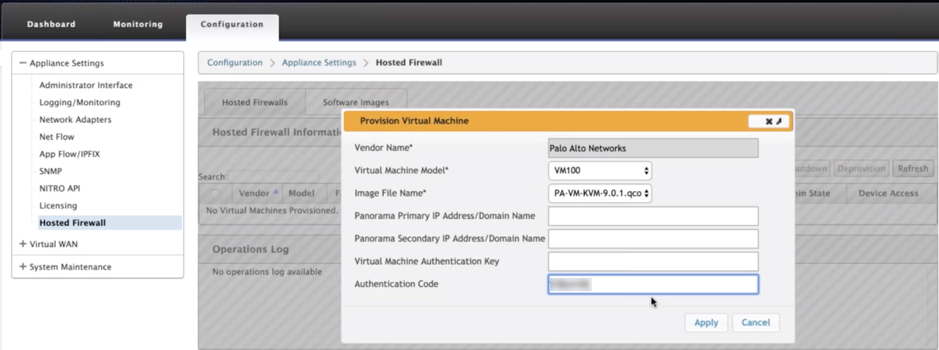
-
Click Refresh to get the latest status. After the Palo Alto Networks virtual machine is completely bootup, it will reflect on the SD-WAN UI with the operations Log detail.
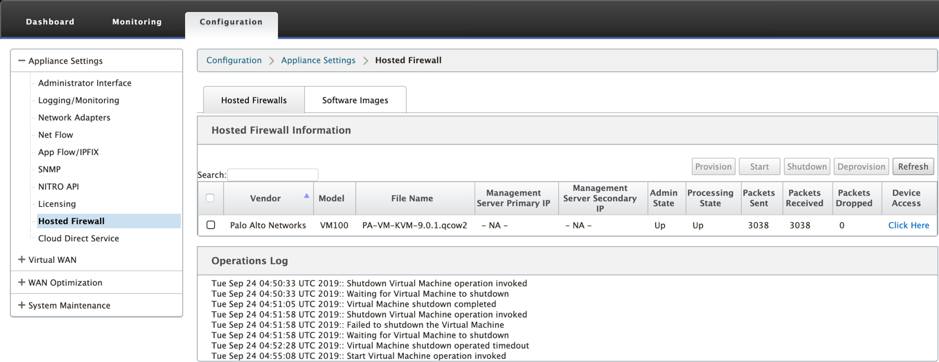
- Admin State: Indicates if the virtual machine is up or down.
- Processing State: Datapath processing state of the virtual machine.
- Packet Sent: Packets sent from SD-WAN to the security virtual machine.
- Packet Received: Packets received by SD-WAN from the security virtual machine.
- Packet Dropped: Packets dropped by SD-WAN (for example, when the security virtual machine is down).
- Device Access: Click the link to get the GUI access to the security virtual machine.
You can Start, Shutdown, and Deprovision the virtual machine as needed. Use Click Here option to access the Palo Alto Networks virtual machine GUI or use your management IP along with 4100 port (management IP: 4100).
Note Always use incognito mode to access the Palo Alto Networks GUI.
Check Point firewall integration the on SD-WAN 1100 platform
Citrix SD-WAN supports hosting Check Point Quantum Edge on the SD-WAN 1100 platform.
The Check Point Quantum Edge runs as a virtual machine on the SD-WAN 1100 SE platform. The firewall virtual machine is integrated in Bridge mode with two data virtual interfaces connected to it. Required traffic can be redirected to the firewall virtual machine by configuring policies on SD-WAN.
For information on how to provision the firewall virtual machine through SD-WAN Orchestrator service, see Hosted firewalls.
Note
From Citrix SD-WAN 11.3.1 onwards, the Check Point VM version 80.20 and above are supported for provisioning VM on new sites.
Benefits
The following are the primary goals or benefits of Check Point integration on the SD-WAN 1100 platform:
-
Branch device consolidation: A single appliance that does both SD-WAN and advanced security
-
Branch office security with on-prem NGFW (Next Generation Firewall) to protect LAN-to-LAN, LAN-to-Internet, and Internet-to-LAN traffic
Firewall virtual machine provisioning through SD-WAN appliance GUI
On SD-WAN platform, provision and boot up the hosted virtual machine. Perform the following steps for provisioning:
-
From the Citrix SD-WAN GUI, navigate to Configuration > Appliance Settings > select Hosted Firewall.
-
Upload the software image:
- Select the Software Images tab. Select the Vendor Name as Check Point.
- Choose the software image file.
- Click Upload.

Note
Maximum of two images can be uploaded. Uploading of the Check Point virtual machine image might take longer time depending on the bandwidth availability.
You can see a status bar to track the upload process. The file detail reflects, once the image is uploaded successfully. The image that is used for provisioning cannot be deleted. Do not perform any action or go back to any other page until the image file shows 100% uploaded.
-
For provisioning, select Hosted Firewall tab > click Provision button.

-
Provide the following details for provisioning.
- Vendor Name: Select the Vendor Name as Check Point.
- Virtual Machine Model: The virtual machine model is auto filled as Edge.
- Image File Name: The image file name is auto-populated.
- Check Point Management Server IP Address/Domain: Provide the check point management server IP address/domain.
- SIC Key: Provide the SIC key (Optional). SIC creates trusted connections between Check Point components. Click Apply.
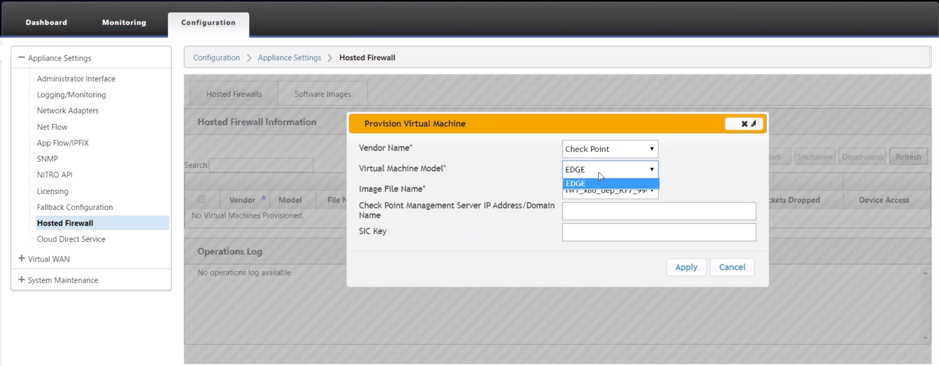
-
Click Refresh to get the latest status. After the Check Point virtual machine is completely bootup, it will reflect on the SD-WAN UI with the operations Log detail.
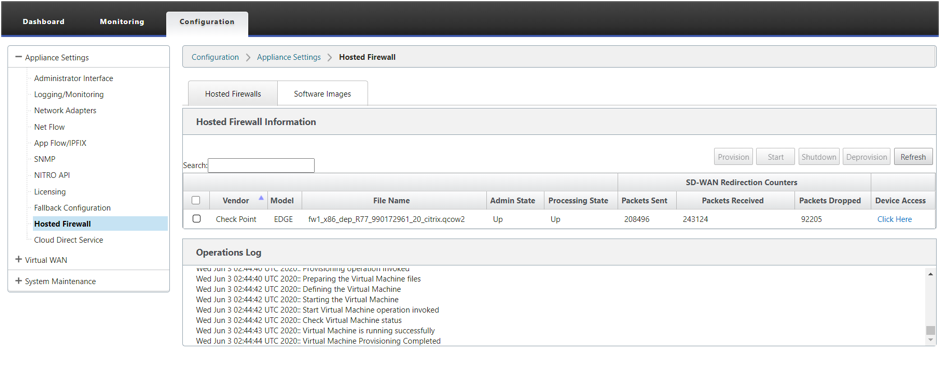
- Admin State: Indicates if the virtual machine is up or down.
- Processing State: Datapath processing state of the virtual machine.
- Packet Sent: Packets sent from SD-WAN to the security virtual machine.
- Packet Received: Packets received by SD-WAN from the security virtual machine.
- Packet Dropped: Packets dropped by SD-WAN (for example, when the security virtual machine is down).
- Device Access: Click the link to get the GUI access to the security virtual machine.
You can Start, Shutdown, and Deprovision the virtual machine as needed. Use Click Here option to access the Check Point virtual machine GUI or use your management IP along with 4100 port (management IP: 4100).
Note
Always use incognito mode to access the Check Point GUI.
While all the network configuration is up and running mode, you can monitor the connection under Monitoring > Firewall > Filter Policies.
